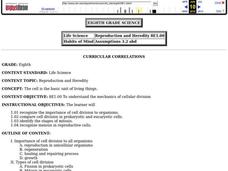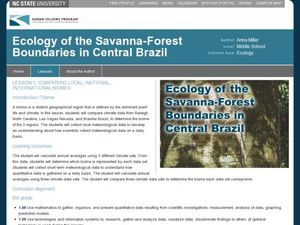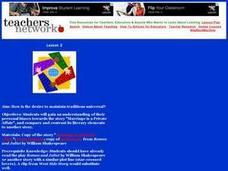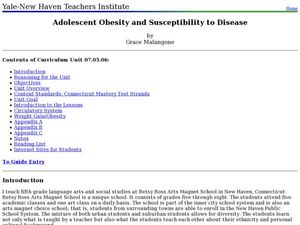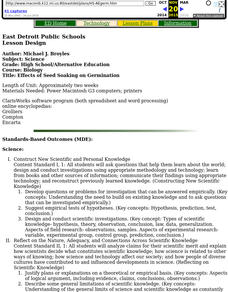Curated OER
The Life and Times of Robert Frost
Students explore the life and times of Robert Frost. Using a fact worksheet imbedded students access websites to gather information about the life and writings of Robert Frost.
Curated OER
Creating Context: The Printing Press as Impetus
Tenth graders examine the invention of the Gutenberg printing press and its effect on society. In groups, they research how much the press enabled various revolutions around the globe. They also identify the causes and effects of each...
Curated OER
Plants and Animals Depend Upon One Another
First graders study plants and animals and how they depend on one another. They also study that plants give energy to animals and provide oxygen needed for life. Finally, 1st graders give examples of the roles plants and animals play...
Curated OER
Reproduction and Heredity
Eighth graders study the importance of cell division, compare cell division in prokaryotic and eucaryotic cells, identify the stages of mitosis and recognize meiosis in reproductive cells.
Curated OER
Anne Carson
Students read poetry and a biography of poet Anne Carson as part of a creative writing instructional activity. In this poetry analysis instructional activity, students read about the poet, read her poetry, and analyze a photograph to...
Curated OER
Comparing Local, National, International Biomes
Students calculate averages of climate sets of data. In this ecology activity, students analyze data to determine identity of a biome and collect meteorological data to understand process. Students also compare data sets.
Curated OER
Transpiration
Students interactively explore the term transpiration. In this science/ecology activity, students discuss what they would do if they were thirsty while conducting research in Brazil. Additionally, students write descriptive words to...
Curated OER
Fairy Tales
Class groups examine fairy tales from a feminist and a Marxist perspective, identifying how these tales present gender roles and class/power systems. The groups then script and perform their own tale that uses one of these lenses.
Curated OER
What If?
Second graders read WHAT IF? up to the page that ends "Suddenly, across the field they saw..." and discuss how the animals are feeling. They then discuss their feelings and in pairs discuss a possible ending to the story.
Curated OER
Julius Caesar: Fate Versus Free Will
Tenth graders engage in a study that is about Julius Caesar while reading a play. The role of the main character is examined while looking for motive and tension presented by Shakespeare. They write a summary and critique of the play.
Curated OER
Outstanding African Americans Activity
Challenge historians to investigate influential African-Americans through this online research activity. Learners undertake this task using online links, some of which require investigative searching. Print the worksheet out first, so...
Curated OER
Learning About Maps
Students take a "field trip" with the teacher through the school then draw a diagram of what they saw. They bring the maps to the computer lab where they create electronic maps using the software program Neighborhood Map Machine.
Curated OER
Tomas and the Library Lady
Students practice read aloud comprehension strategies. In this literacy comprehension lesson plan, students listen to Tomas and the Library Lady, stopping to discuss with a partner aspects of the story suggested by the teacher. Students...
Curated OER
Concern + Action = Clean Air Solutions
Students participate in a service project about improving air quality. For this air quality lesson, students understand the problems and solutions for improvement of air quality issues. Students discuss and choose an air quality service...
Curated OER
Universal Traditions
Students research personal bias towards the story Marriage is a Private Affair. In this tradition research lesson, students read the story and discuss the ending. Students free write about the topic and complete a Venn diagram to compare...
Curated OER
One Room Many Minds
Students study the ways in which one room schoolhouses were an integral part of Canadian society. They explore the economic, geographic, and cultural contributions to their establishment and speculate about and compare education...
Curated OER
Louisiana Regional Foodways
Learners strengthen their research techniques in locating, selecting, and synthesizing information from a variety of texts, media, references and internet resources to study regional food way traditions in Louisiana. They assess the...
Curated OER
Preparing the Soil
Students explore the concept of philanthropy. In this service learning lesson, students read Seedfolks and discuss the characters in the story and consider their actions that led to a community garden. Students journal about their...
Curated OER
World Population Activity I: Excel
Students use Excel to explore population dynamics using the Logistic equation for (S-shaped) population growth. This activity is primarily intended as an introductory tutorial on using Excel.
Curated OER
Adolescent Obesity and Susceptibility to Disease
Students understand the importance of maintaining a healthy weight and good health. In this health lesson students read text then create their own pamphlet on the cardiovascular system, weight gain, treatments and health risks.
Curated OER
The Study of the Spanish-Speaking People of Texas: Daily Life
Students analyze the different ways that photography helps historians understand the lives of people who lived in the past. They examine images from Russell Lee's photo essay and discuss how Texas' has changed from an agrarian to an...
Curated OER
Effects of Seed Soaking on Germination
Students explain the standard growth pattern of a monocot seedling and word process a finished essay.
Curated OER
Bird Beak Anatomy
Third graders participate in an activity to determine which tool will work the best to gather food. They create analogies about how the experiment relates to birds. They brainstorm about which adaptation helps or hurts the survival of an...
Curated OER
Rapid Mycological Assessment
Students examine types of mycology methods. They practice using new vocabulary and answer key questions. They complete a field survey and analyze their results.





